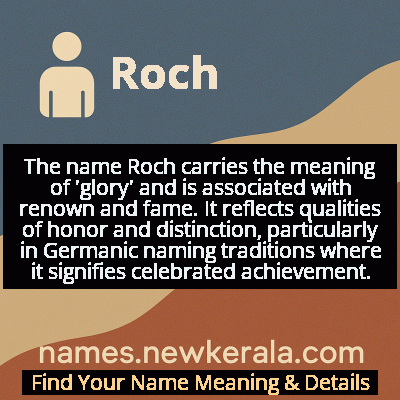Roch Name Meaning & Details
Origin, Popularity, Numerology Analysis & Name Meaning of Roch
Discover the origin, meaning, and cultural significance of the name ROCH. Delve into its historical roots and explore the lasting impact it has had on communities and traditions.
Name
Roch
Gender
Male
Origin
German
Lucky Number
8
Meaning of the Name - Roch
The name Roch carries the meaning of 'glory' and is associated with renown and fame. It reflects qualities of honor and distinction, particularly in Germanic naming traditions where it signifies celebrated achievement.
Roch - Complete Numerology Analysis
Your Numerology Number
Based on Pythagorean Numerology System
Ruling Planet
Saturn
Positive Nature
Ambitious, efficient, realistic, and authoritative.
Negative Traits
Materialistic, stressed, confrontational, and can be overly ambitious.
Lucky Colours
Dark blue, black.
Lucky Days
Saturday.
Lucky Stones
Blue sapphire, amethyst.
Harmony Numbers
2, 4, 6.
Best Suited Professions
Business leaders, managers, financial services, law enforcement.
What People Like About You
Leadership, determination, organizational skills.
Famous People Named Roch
Saint Roch
Christian saint
Patron saint of plague victims and miraculous healer during Black Death
Roch Voisine
Singer-songwriter
Internationally successful Canadian francophone musician
Roch Thériault
Cult leader
Notorious leader of Ant Hill Kids cult in Quebec
Roch Carrier
Author
Renowned Canadian writer and former National Librarian
Name Variations & International Equivalents
Click on blue names to explore their detailed meanings. Gray names with will be available soon.
Cultural & Historical Significance
In Germanic regions, the name evolved into Rochus and became particularly popular in Catholic areas of Germany, Austria, and Switzerland, often chosen for boys born during times of epidemic or hardship as a protective invocation. The name carries strong associations with healing, protection, and Christian charity, reflecting the saint's legendary miracles and selfless service during the Black Death. Throughout European history, the name has maintained its connection to both Germanic linguistic heritage and Catholic hagiography, creating a unique cultural bridge between secular and religious traditions.
Extended Personality Analysis
Individuals named Roch are often perceived as strong, resilient, and principled characters with a natural inclination toward leadership and service. They typically exhibit a blend of traditional values and independent thinking, showing loyalty to their beliefs while maintaining the courage to stand apart from the crowd. Many Roachs demonstrate a protective nature toward others, often taking on caretaker roles in both personal and professional contexts, reflecting the name's historical association with healing and protection.
Their personality often combines practical wisdom with spiritual depth, making them sought-after advisors and confidants. While they can be somewhat reserved in unfamiliar settings, they reveal warm, compassionate qualities to those they trust. The historical association with Saint Roch lends an expectation of integrity, healing capability, and the strength to overcome adversity, traits that often manifest in modern bearers of the name through careers in medicine, counseling, education, or community leadership. This combination of strength and compassion makes Roachs particularly effective in crisis situations where both practical action and emotional support are required.
Modern Usage & Popularity
In contemporary times, Roch remains a relatively uncommon but respected name, primarily found in German-speaking regions, Quebec, and among families with strong Catholic traditions. The name has maintained steady but low usage rates, often chosen by parents seeking a distinctive yet historically significant name with religious connotations. In Germany and Switzerland, the variant Rochus is slightly more common, particularly in Catholic communities where traditional saints' names retain cultural importance. The name experiences occasional revivals during times of health crises or among families with historical connections to Saint Roch, though it generally remains outside mainstream naming trends in most Western countries.
Symbolic & Spiritual Meanings
Symbolically, Roch represents protection, healing, and spiritual resilience. The name evokes images of the pilgrim saint healing plague victims, making it emblematic of overcoming suffering and disease. It carries connotations of divine intervention and miraculous recovery, symbolizing hope in times of crisis and the human capacity for compassion in the face of adversity. The association with dogs (from the legend of Saint Roch's faithful canine companion) adds layers of loyalty, guidance, and unconditional service to the name's symbolic repertoire. As a name meaning 'glory,' it also symbolizes earned honor through service rather than inherited status, representing the triumph of compassion over adversity and the idea that true renown comes from selfless acts rather than personal ambition.

